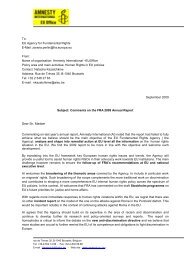Time for eULeX To prioriTize war crimes - Amnesty International ...
Time for eULeX To prioriTize war crimes - Amnesty International ...
Time for eULeX To prioriTize war crimes - Amnesty International ...
Create successful ePaper yourself
Turn your PDF publications into a flip-book with our unique Google optimized e-Paper software.
64<br />
Kosovo: <strong>Time</strong> <strong>for</strong> EULEX to prioritize <strong>war</strong> <strong>crimes</strong><br />
consequently rejected since the period of statutory limitation has expired”.<br />
32 SRFY CC, Article 142. See, <strong>for</strong> example, District Court of Prizren, P.No.134/11, 2 August 2011, VII<br />
(5), http://www.eulex-kosovo.eu/docs/justice/judgments/criminal-proceedings/DCPrizren/134-<br />
11/(2011.08.02)%20JUD%20-%20Ejup%20KABASHI%20et%20al%20(DC%20PZ).ENG_redacted.pdf<br />
33 Criminal Code of Kosovo, Article 129. In at least some respects, Article 129 falls short of international<br />
law. For example, principles of superior responsibility with regard to civilians in Article 129 (2) are not as<br />
strict as required by customary international law, as well as conventional international law, such as<br />
Protocol I, which holds civilian superiors to the same standards as military commanders.<br />
34 “At the time the crime was committed, a written or unwritten norm must have existed upon which to<br />
base criminality under international law. The principle of legality (nullum crime sine lege) is part of<br />
customary international law”, Gerhard Werle, Principles of <strong>International</strong> Criminal Law ,TMC, Asser Press,<br />
p.32.<br />
35 http://www.balcanicaucaso.org/eng/Regions-and-countries/Kosovo/EULEX-the-delicate-balance-of-<br />
justice-96838<br />
36 On the contrary Article 95 of the CCK provides that: “No statutory limitation shall apply to the<br />
prosecution or execution of punishment of genocide, <strong>war</strong> <strong>crimes</strong> and <strong>crimes</strong> against humanity, as well as<br />
of other criminal offences to which statutory limitation cannot be applied under international law.”<br />
37 <strong>Amnesty</strong> <strong>International</strong> distinguishes en<strong>for</strong>ced disappearances -- in which state agents are directly or<br />
indirectly involved -- from abductions carried out by non-state actors, such as armed opposition groups.<br />
38 HLC-Kosovo, “Human losses during the NATO bombing”, 23 March 21012, http://www.hlcrdc.org/?p=19413&lang=de<br />
39 Constitution of the Republic of Kosovo (entered into <strong>for</strong>ce: 15 June 2008), Article 33 (1). The<br />
Principle of Legality and Proportionality in Criminal Cases.<br />
40 See <strong>for</strong> example, Papon v. France, (No. 2) no. 54210/00. November 15, 2001; <strong>To</strong>uvier v. France, No.<br />
29420/95, January 13, 1997; Kolk and Kislyiy v. Estonia, Nos. 23052/04 and 24018/04, January 17,<br />
2006; and Streletz, Kessler and Krenz v. Germany, Nos. 34044/96, 35532/97 and 44801/98..<br />
41 “According to the principle of legality, everybody must know in advance whether specific conduct is<br />
consonant with, or a violation of, penal law […]. [a]ccording to Article 15 [of the <strong>International</strong> Covenant<br />
on Civil and Political Rights] of which no breach of the nullum crimen principle exists when the act was<br />
criminal "under national or international law, at the time when it was committed”.<br />
“This provision does not necessarily entail, however, that the authorities of a State party to the ICCPR<br />
may try and convict a person <strong>for</strong> a crime that is provided <strong>for</strong> in international law but not yet codified in<br />
the domestic legal order: in criminal matters, international law cannot substitute itself <strong>for</strong> national<br />
legislation; in other words, international criminalization alone is not sufficient <strong>for</strong> domestic legal orders<br />
to punish that conduct. Nevertheless, Article 15 of the ICCPR allows at the very least that fresh national<br />
legislation (or, where admissible, a binding case) defining a crime that was already contemplated in<br />
<strong>Amnesty</strong> <strong>International</strong> April 2012 Index: EUR 70/004/2012



